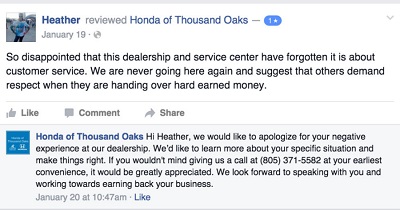Before You Go!
Sign up for our newsletter - which features professional templates, job market updates, articles, playlists, recipes, and more, sent directly to your inbox!



A company’s reputation has always mattered and how customers feel about the product and brand has always determined the company’s growth. However, in today’s digital marketplace, a business’s reputation is more important, public, and permanent than ever before. According to a national survey conducted in 2018, 86% of consumers read online reviews before visiting a business, but let’s face it, everyone checks online reviews.
With 91% of consumers trusting online reviews as much as personal recommendations, the drive for “social proof” has grown exponentially within the digital marketplace. Social proof has to do with the influence that those around us have on our own behavior: people view a behavior as more correct when they see many people performing it. In other words, if people see others enjoying your product, they will assume they’ll like it too and seek it out. With more and more consumers seeking social proof when making a decision about where to take their business, companies are scrambling to improve their online reputation. But where do businesses start in order to grow a positive online reputation? We know online reputation matters, but how can we actually take control of it and improve it in order to shine a light on how great our product and company really is? The following is a list of 6 proactive things every company should be doing to manage their online reputation and grow:

The first step in improving your online reputation is simply to monitor it. Get an idea of what others are seeing online by searching your company name on Google, then try “[company name] reviews”, “[company name] articles” and so on. Make sure you’ve claimed and have control as many of those pages as possible. Most websites that include information on your business provide you the ability to claim those pages and make adjustments. You’ll be able to enhance these pages with things like the company description, social media links, and images and then begin implementing the other items listed below.
Be proactive in seeking out customer feedback via email or on the phone to build a strong relationship with your customers and provide them with a point of contact to address any issues with that arise. You should be not only be accessible to your consumers, but also engaging. Follow up with the customer a few days or weeks after the sale to make sure they are still satisfied with their purchase and if there’s anything else you can do for them. This way, you’re able to address any issues personally before a potentially disgruntled customer turns to a public online platform to voice their complaints.
Make sure your team monitors customer feedback closely and replies quickly (especially when a customer has a grievance) in order to build trust and prevent public backlash. One method brands use to easily manage their customer relationships is CRM (Customer Relationship Management) software. Not only can CRM help with your online reputation, it also can provide valuable information on what your customers are saying and sharing about you or your competitors.

The biggest mistake companies make when dealing with negative reviews is to not deal with them at all. Regardless of whether you feel you deserved a negative review or not, your online reputation suffers. Ignoring a publicly available negative review not only hurts your relationship with that customer, but it also hurts your relationship with other potential customers. 89% of consumers read businesses’ responses to negative reviews before visiting a business or purchasing a product. In other words, customers aren’t just looking for social proof when deciding to give you their business, they’re also looking at how you treat or respond to your customers.
Always respond to negative claims publicly to show that you acknowledge that customer’s opinion and intend to assist them. Make sure to begin with an apology, move the situation to a more personal setting (either a social media DM [direct message] or an email), and keep your response short and sweet. For a more in-depth guide on how you can respond to negative feedback, read this Forbes article on How to Respond to Negative Reviews.
Don’t stop there. Any time you reach out to a customer, make sure you follow through on any promises you have made to them. Following through will show your customers that you care and prevent negative reviews in the future. It is also necessary to be consistent with your responses. Inconsistency (especially when dealing with a negative review) could lead to discriminatory claims and customer distrust in your company. So treat all reviews equally.
The most successful companies in today’s lifestyle-driven market are the ones who are the most authentic. Customers are becoming increasingly aware of when they’re being advertised to and don’t want to just see your product or service, they want to know what it’s like to experience it. Think, “How does my product or service affect the lives of my customers?” Then, don’t just TELL your customers, SHOW them how it affects them with images/videos and valuable information. If you’re a new home builder, displaying images of the home is great, but it’s also important to potential buyers what their life would be like living in that home and that community. What kind of lifestyle would that home suit? What kind of activities or family memories could they have or build in that home? Remember to always be honest with your customers. You lose authenticity and your online reputation suffers when customers discover you haven’t been 100% honest with them.
Another great way to stay honest and be authentic with your customers is to show them what goes on “behind the scenes.” Customers are just as interested in what goes into making the product as they are with the product itself. They want to know that your company isn’t just a corporate machine, and want to see that there are real people who care & are working behind the scenes to deliver the best possible service.

Remember how we mentioned earlier that customers don’t just look for social proof, they need it? One of the best ways to give your potential customers that much needed social proof is to share user-generated content. User-generated content is any kind of photo, video, or blog that your customers have shared online to show their experience with your product or service. The more user-generated content you have available online, the more customers will trust you and your brand.
Encourage your customers to upload photos and share their content on your platforms so you can share it with others. If you’re struggling to get quality user-generated content, consider working with an influencer or a partner to help grow your brand. Influencers are a great source for quality user-generated content and also to help boost awareness of your brand. Not sure where to start with influencers and partnerships? Try this guide on How to Work with Influencers on Hubspot.
One of the easiest ways to improve your online reputation is to simply ask for a positive review. Great customer reviews are priceless but unfortunately, when a customer has a positive experience with a company they are much less likely to take the time to review it. Those who suffer a bad interaction are 50% more likely to share it on social media and 52% more likely to share it on an online review site than those who had a good interaction (marketingcharts.com).
This is why it is so important to take the time to reach out to that customer to personally ask for a review. Most of the time, the customer is happy to share, they had just never thought about doing it. Yes, that’s right! Receiving a positive online review can be as easy as reaching out to a satisfied customer. Next time you come across a satisfied customer, send them a direct link to the platform you are focusing on (Yelp, Google, Glassdoor, Facebook, etc.) and ask them if they would share their experience with your company. The more positive reviews you have, the less likely a negative review will affect your company’s online ratings.
It’s impossible to escape what others say about your company. That’s why it’s important to not only know what they are saying, but to also know how you can use it to grow your online reputation. Find out what your customers are saying by monitoring your online presence. Give customers the social proof they are looking for by actively seeking feedback and always responding to negative reviews publicly. Lastly, show them you are trustworthy by being authentic & honest.
